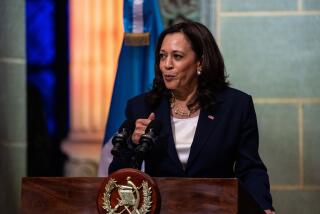No-show, no help in attorney probe
With Karl Rove a no-show and one of his top foot soldiers refusing to answer questions, Democrats on the Senate Judiciary Committee made little progress Thursday in their effort to learn more about the role of the White House in the firing of U.S. attorneys last year.
Rove had sent advance word through the White House counsel’s office that he did not believe the law required that he appear at the Thursday hearing despite a congressional subpoena. The lone witness was J. Scott Jennings, the deputy political affairs director, who politely but firmly rejected numerous requests to describe his role in the firings.
Frustrated Democrats, who have claimed the dismissals were calculated by the Bush administration to aid the Republican Party, accused the White House of stonewalling.
“Senator, I’m doing the best I can,” said Jennings. He said he was on orders from President Bush to invoke executive privilege and answer no questions about the dismissals. “Believe me, this is likely as frustrating for me as it is for you.”
“No, trust me, it is not,” said Chairman Patrick J. Leahy (D-Vt.).
The exchange underscored how the six-month congressional probe -- into whether politics improperly influenced hiring and other decisions at the Justice Department under Atty. Gen. Alberto R. Gonzales -- seems on the verge of flaming out. The White House, asserting executive privilege, refuses to cooperate with investigators, leaving Congress with few options.
After Labor Day, Leahy’s committee is likely to consider contempt-of-Congress proceedings against White House officials for their refusal to cooperate. The House Judiciary Committee initiated such proceedings last week. But contempt-of-Congress actions can only be enforced by the Justice Department, and officials there have signaled they will not prosecute officials who assert executive privilege.
“Where is Karl Rove? Why is he hiding?” asked Sen. Richard J. Durbin (D-Ill.), a committee member. “Why does he throw a young staffer like you into the line of fire while he hides behind the White House curtains?”
Jennings, 29, was accompanied by a White House lawyer as well as his personal attorney, and frequently consulted with both. He declined to describe his role in the firings or say whether he had ever met with the president about them.
He acknowledged having had a “social breakfast” in the White House Mess with two New Mexico Republicans. The two had been dissatisfied with their state’s U.S. attorney at the time, David C. Iglesias; but Jennings testified he didn’t think that topic -- or any business-related subject -- came up.
Jennings declined to testify about an e-mail exchange from June, around the time of the breakfast, indicating he set up a meeting between the two Republicans and a top Gonzales aide instrumental in the dismissals. Iglesias, who was among those later fired, has accused Republicans of orchestrating his ouster.
The White House has offered to make Rove and some officials available for questioning, but only in private and without a transcript or follow-up questions. Democrats have said the conditions are unacceptable.
The ranking Republican on the committee, Sen. Arlen Specter of Pennsylvania, said Democrats should accede to some of the demands because there was no hope of getting the information otherwise. He said the probe was in danger of dragging on for years.
Specter has been Gonzales’ most outspoken Republican critic.
“This investigation needs to be completed,” Specter said, “because I believe that when the committee finishes its investigation and files a report that we may well see the end of the tenure of Atty. Gen. Gonzales.”
--
More to Read
Get the L.A. Times Politics newsletter
Deeply reported insights into legislation, politics and policy from Sacramento, Washington and beyond. In your inbox three times per week.
You may occasionally receive promotional content from the Los Angeles Times.






